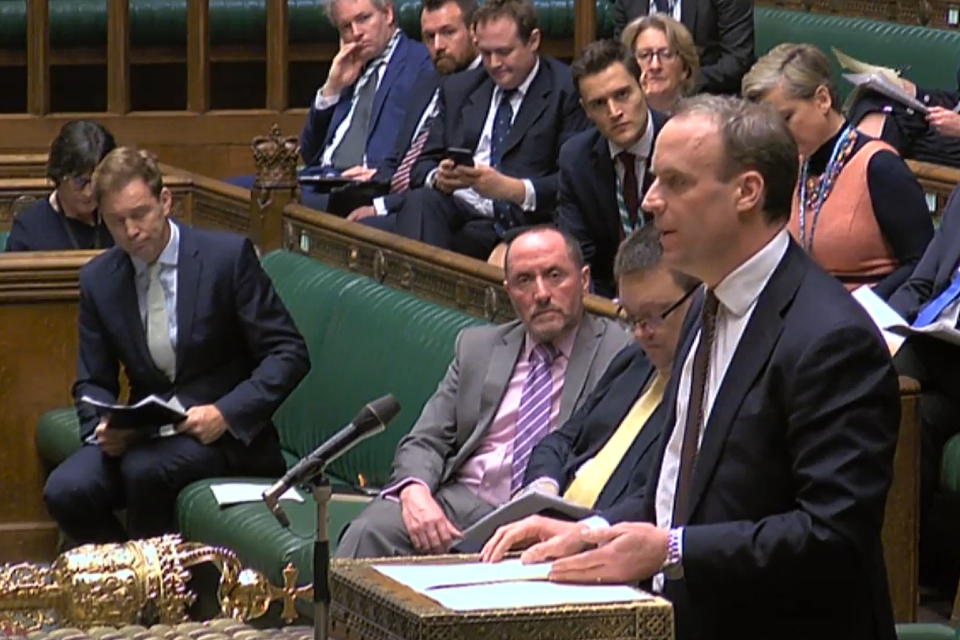Iran: Foreign Secretary's Commons statement, 13 January 2020
Foreign Secretary Dominic Raab answered an urgent question in the House of Commons about the government's response to the security situation in Iran.

Mr Speaker, further to the oral statement on the 7 January by the Defence Secretary, I would like to make a statement on Iran, in response to the urgent question from my honourable friend.
I would first like to express my condolences to the loved ones of those tragically lost on Ukrainian International Airlines Flight PS752. Our thoughts are with all of those affected during what must be a devastating time.
Among the 176 passengers who tragically lost their lives, were 4 British nationals, as well as 82 Iranians.
On the 9 January, we stated publicly, alongside our partners such as Canada and the United States that given an increasing body of information, we believed Iran was responsible for the downing of UIA Flight 752.
Despite the initial denials, the Government of Iran acknowledged on the 11 January that they were responsible.
Now is the time for a full, transparent and independent investigation. This must be a collaborative endeavour, with a strong international component. The families of the victims – including those in Iran – must have answers and must know the truth.
Mr Speaker, the UK is also working with the Canadian-led International Coordination and Response Group, consisting of countries with nationals killed in the plane crash. This group will help with the issuing of visas and the repatriation of the bodies of victims.
Watch the Foreign Secretary’s statement
Separately, Mr Speaker, Her Majesty’s Ambassador to Iran, Rob Macaire, was arrested over the weekend and illegally held for 3 hours.
On the 11 January, the Ambassador attended a public vigil to pay his respects to the victims of Flight 752. He left shortly after arrival when there were signs that the vigil might turn into a protest.
Let me be very clear about this. He was not attending or recording a political protest or demonstration. His arrest later that day, without grounds or explanation, was a flagrant violation of international law.
In response, we today will be summoning the Iranian ambassador to demand an apology and seek full assurances this will not happen again.
Given the treatment of the Ambassador, we are keeping security measures for the Embassy under review.
And we updated our travel advice on the 10 January. As am sure the House will expect, we currently recommend British nationals do not travel to Iran, or take any flights to, from or within Iran.
On the diplomatic front, in the past week, I have met with our partners in Brussels, Washington and Montreal, including an E3 meeting yesterday evening in Paris.
I have spoken to Foreign Minister Zarif, and the Prime Minister spoke to President Rouhani.
We welcome the overwhelming international support for Her Majesty’s Ambassador to Iran, and the rights to which all diplomats are entitled to under the Vienna Convention on Diplomatic Relations.
Mr Speaker, the regime in Tehran is at a crossroads. It can slip further and further into political and economic isolation.
But there is an alternative and the regime does have a choice. The diplomatic door remains open.
Now it the time for Iran to engage in diplomacy and chart a peaceful way forwards.
I commend this statement to the House.